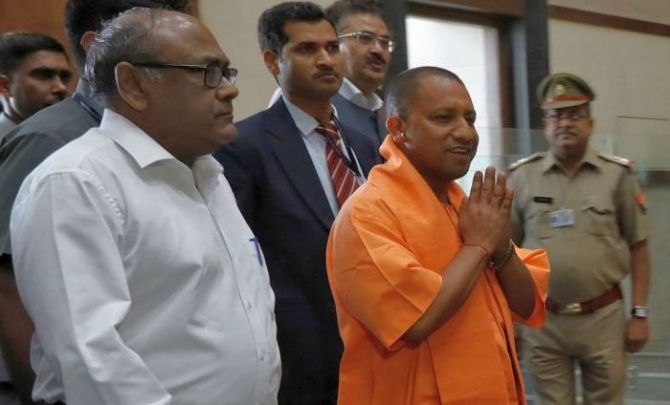The recruitment of babus during the Akhilesh government's tenure allegedly favoured applicants from one community -- the Yadavs.
Virendra Singh Rawat reports from Lucknow.

In July, Uttar Pradesh Chief Minister Yogi Adityanath announced a Central Bureau of Investigation probe into allegations of rigging in the appointments made by the Uttar Pradesh Provincial Service Commission since 2012.
The chief minister took to the floor of the assembly during the budget session to make the announcement.
Allegations of widespread wrongdoing in the UPPSC recruitment process, he said, have hurt the state service commission's credibility, and the only way to clear things up was to hold an impartial CBI inquiry.
Since 2012, few appointments in the state's provincial services have been without controversy.
The person in the thick of the quagmire is Anil Yadav, the UPPSC chairman from 2013 to 2015.
Yadav has been accused of politicising the recruitment process during the Akhilesh Yadav-led Samajwadi Party government's tenure in the state to favour applicants from one community -- the Yadavs.
One estimate puts the number of allegedly falsified appointments at 3,000 during Anil Yadav's tenure.
Some say as many as 20,000 appointments, including those in the judicial and medical services, could be investigated by the CBI.
For now, the state government has put all controversial appointments made in the past on hold.
Discontent among the applicants started to brew in 2015 when the Akhilesh government was in power.
In March, violent protests erupted in Allahabad, and spread to other cities, after question papers for the UPPSC examination were leaked on the messaging service WhatsApp barely a few hours before the tests were to start.
Angry students set ablaze government transport vehicles and demanded Anil Yadav's removal while the Opposition picked up the issue to target the Akhilesh government.
The episode brought enough embarrassment for the Akhilesh government; the paper leak not only pointed to irregularities in recruitment, but also undermined confidence in the government.
Later, in July 2015, a group of unsuccessful UPPSC aspirants approached the Allahabad high court seeking revaluation of their answer sheets.
The applicants claimed more than 50 per cent of the candidates selected as sub-divisional magistrates in the preceding three examinations held by the UPPSC were from the Yadav community.
In their public interest litigation filed before the Allahabad high court in 2015, the petitioners claimed of the 86 sub-divisional magistrates selected in the previous three exams during Anil Yadav's tenure, 56 belonged to one community.
In other appointments, too, they said, over 50 per cent of the selected candidates were from the same caste.
The petitioners also urged the high court to remove Anil Yadav as the UPPSC chairman and institute a CBI investigation into the matter.
According to the PIL, 72 of the 389 provincial civil services officers selected in 2011 were Yadavs.
Of them, 45 candidates were in the list for the other backward castes and 27 belonged to the general category.
Yadav had taken over as UPPSC chairman in April 2013, and three provincial civil services examinations -- for 2011, 2012 and 2013 -- were conducted during his tenure, when the alleged discrepancies are said to have crept in.
The petitioners said the UPPSC examination process was mired in discrepancies and smacked of a well-connected racket involving highly placed people; beyond the vested interest of appointing candidates from a particular caste, money had also exchanged hands, they alleged.
It was also alleged that Anil Yadav had facilitated the implementation of a scaling system that enabled a candidate securing even zero marks in certain subjects to qualify the exam, as the selection list was prepared after including the marks obtained in the interview.
This apparently defective system, the petitioners alleged, marred the chances of many a candidate, who had secured good marks in the written exam, but could not do well enough in the interviews.
This was not the only controversial change to the UPPSC examination process made during Anil Yadav's term.
He had also implemented a three-tier reservation system that introduced caste-based quotas at the written test stage itself.
However, the UPPSC was forced to retract this decision following widespread protests.
Nonetheless, the spectre of irregularities had started to haunt the provincial examination process even before the 2015 case was filed in the high court.
In February 2014, the Allahabad high court had sought a reply from the Akhilesh Yadav government on a PIL alleging irregularities in the exam conducted by the UPPSC.
However, the court rejected the petitioner's plea for a CBI inquiry observing that only the Supreme Court was vested with the power to order such an inquiry against a member of a public service commission.
Anil Yadav, who was earlier the principal of Sri Chitragupta PG College in Mainpuri district, a stronghold of the Samajwadi Party, is believed to be close to the party patriarch, Mulayam Singh Yadav.
In 2006, he was appointed a member of the UPPSC, and his tenure was a rocky one.
He was accused of brazenly supporting and patronising applicants from the Yadav community. There were violent agitations over his autocratic work style too.
Grave concerns were also raised over his educational credentials.
A Right to Information query seeking details of his qualifications was blocked by the state government -- until the Allahabad high court intervened.
In October 2015, in a big jolt to the Akhilesh government, the high court ordered his removal as UPPSC chairman.
A two-judge bench hearing a PIL filed by the Bhrashtachar Mukti Morcha, an umbrella body of unsuccessful provincial civil services candidates, said there were several doubts over Yadav's bona fides and as such, he was untenable to hold on to the post.
Now, it is the appointments during his tenure that face scrutiny.
Photograph: PTI Photo











